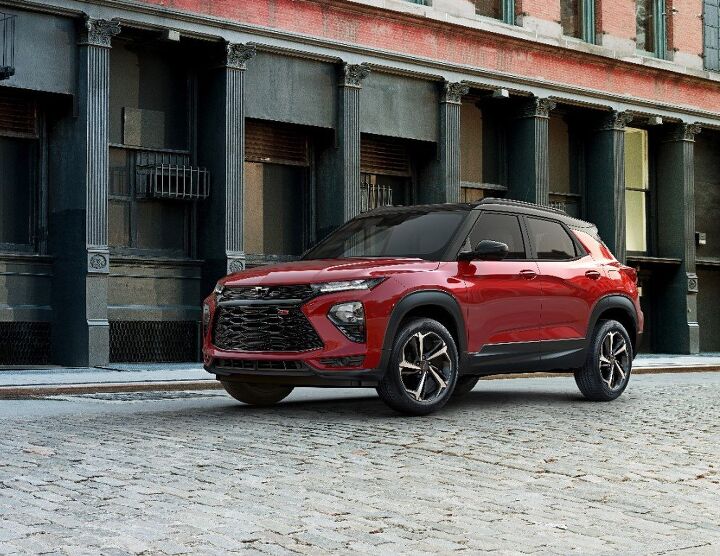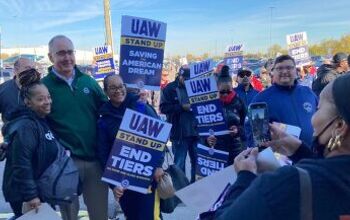Chevrolet Trailblazer Seeps Into EPA's MPG Listings

The unexpected and potentially under-cylindered 2021 Chevrolet Trailblazer is a vehicle you would have read about in these digital pages, had the pandemic not scrubbed a first drive event scheduled for late last week. For sure, yours truly was quite curious to see how well the model’s brace of boosted three-cylinders hauled around the tweener crossover’s modest bulk.
Alas, drive impressions are off the table as we deal with this virus thing. We’ve told you the specs already, given you a taste of what to expect from the not-quite-compact CUV and its Buick Encore GX sibling, and even revealed the EPA ratings of the latter model.
Now it’s time to hit the trail(blazer).
What’s the point, you say — same platform, same powertrains. Consumption should be the same, right? Not exactly. The EPA has revealed the gas mileage of one Trailblazer variant: the loaded, 1.3-liter, all-wheel drive version. That model puts its muscle down via a nine-speed automatic.
Power amounts to 155 horses and 174 lb-ft of torque and, in Buick form, this exact package garners an EPA rating of 26 mpg city, 29 mpg highway, and 28 mpg combined.
The donning of a bowtie badge brings a pleasant surprise for Chevy fans, as, while the city and combined ratings stay the same, highway fuel consumption rises by a single MPG, or 30 mpg even. It’s likely just a fraction of an MPG, given the usual rounding up and down of efficiency figures. Regardless, “30 mpg”, like beverage calories, is something you can highlight prominently on billboards and in marketing materials.
As for the front-drive 1.3L model and FWD-only 1.2L Trailblazer models (there’s 137 hp and 166 lb-ft on tap from the smaller of the two mills, btw), their exact thirst remains unknown. The EPA cites figures of 30 city/32 highway/31 combined for the AWD/1.3L Encore GX and 26/30/28 for the 1.2L version. Could the Trailblazer top both of these highway numbers? We’ll know soon enough.
Pricing should follow shortly, with GM claiming the base Trailblazer will fall below the $20k marker.
[Image: General Motors]

More by Steph Willems
Latest Car Reviews
Read moreLatest Product Reviews
Read moreRecent Comments
- Jkross22 When I think about products that I buy that are of the highest quality or are of great value, I have no idea if they are made as a whole or in parts by unionized employees. As a customer, that's really all I care about. When I think about services I receive from unionized and non-unionized employees, it varies from C- to F levels of service. Will unionizing make the cars better or worse?
- Namesakeone I think it's the age old conundrum: Every company (or industry) wants every other one to pay its workers well; well-paid workers make great customers. But nobody wants to pay their own workers well; that would eat into profits. So instead of what Henry Ford (the first) did over a century ago, we will have a lot of companies copying Nike in the 1980s: third-world employees (with a few highly-paid celebrity athlete endorsers) selling overpriced products to upper-middle-class Americans (with a few urban street youths willing to literally kill for that product), until there are no more upper-middle-class Americans left.
- ToolGuy I was challenged by Tim's incisive opinion, but thankfully Jeff's multiple vanilla truisms have set me straight. Or something. 😉
- ChristianWimmer The body kit modifications ruined it for me.
- ToolGuy "I have my stance -- I won't prejudice the commentariat by sharing it."• Like Tim, I have my opinion and it is perfect and above reproach (as long as I keep it to myself). I would hate to share it with the world and risk having someone critique it. LOL.


































Comments
Join the conversation
You might want to get over your love of the Rav4 and look at it more objectively. "The Rav4 Hybrid is rated 41 city 38 highway. So 39.6 is absolutely everyday mileage." My Chevy Colorado is rated at 19 city and 24 highway. I achieve 17.5 city and 27 highway. Granted the hybrid does much better in the city than a non-hybrid but I've also noted that most hybrids don't achieve their highway ratings unless you are a VERY conservative driver. Also, having driven one, I find that they are relatively sluggish in everyday driving unless you really try to drive with some 'enthusiasm', which still hurts their economy as that underpowered NA engine has to work harder just to meet the energy demand. More on that in a moment. "The Rav4 Hybrid has a 2.5L naturally aspirated engine, which is over a liter bigger than the biggest engine you can get in the trailblazer." --- But has less horsepower, which validates my statement as the Chevy Volt absolutely demonstrated 10 years ago. Note: Again I point out that this Trailblazer isn't getting any better economy than a 2002 Saturn Vue carrying the Opel 2.4L four-banger. Note also that this Trailblazer also has about 20hp more as well as higher torque than said Saturn in a smaller and lighter body. Your NA 2.0 liter engine is little, if any, stronger than that Saturn's, meaning the turbocharging overcomes the power limitations of a normally-aspirated engine. "I’m not sure why you’re comparing the current generation of Toyota Hybrids with a 10 year old GM design, but this is not and never has been a concern with Toyota’s Hybrid system." --- I've driven the Toyota Hybrid system many times. One of my best clients owned a Toyota hybrid and I will acknowledge that he was quite impressed with its in-town economy. However, on longer trips the vehicle never achieved its rated highway economy, to the point that they stopped trying and drove his wife's Kia Sonoma on longer trips because it achieved significantly better economy than the Toyota over the highway. As for the Rav4 Hybrid still on the road in 10 years? Perhaps. But that 10-year-old Trailblazer will be right there beside it, even if not in similar numbers. (I really doubt its sales will ever match the Toyota's.) On the other hand, I also expect that BEVs will be on the verge of matching, if not out-numbering ICEV and Hybrid sales by then.
I have a 2003 Trailblazer. Love it. Does everything we want. Getting long in the tooth, though. I wish I could buy another brand-new 2003 Trailblazer, but with the LS V8 instead of the 4.2L six. (As sixes go, the Atlas is a good one; I'd just prefer a 5.3 or perhaps 6.0 LS.) The 2021 Trailblazer is a piece of shit. How can GM expect to sell the thing? Looks like a fishmouth Lexus. Hateful. Three cylinders? I don't buy vehicles with four-poppers. I don't buy MOTORCYCLES with fewer than four cylinders. The best vehicles have more than one engine cylinder for every road wheel. I guess the '03 is gonna have to soldier on for a few more years. God bless full-frame construction, 4WD, and V-8s.